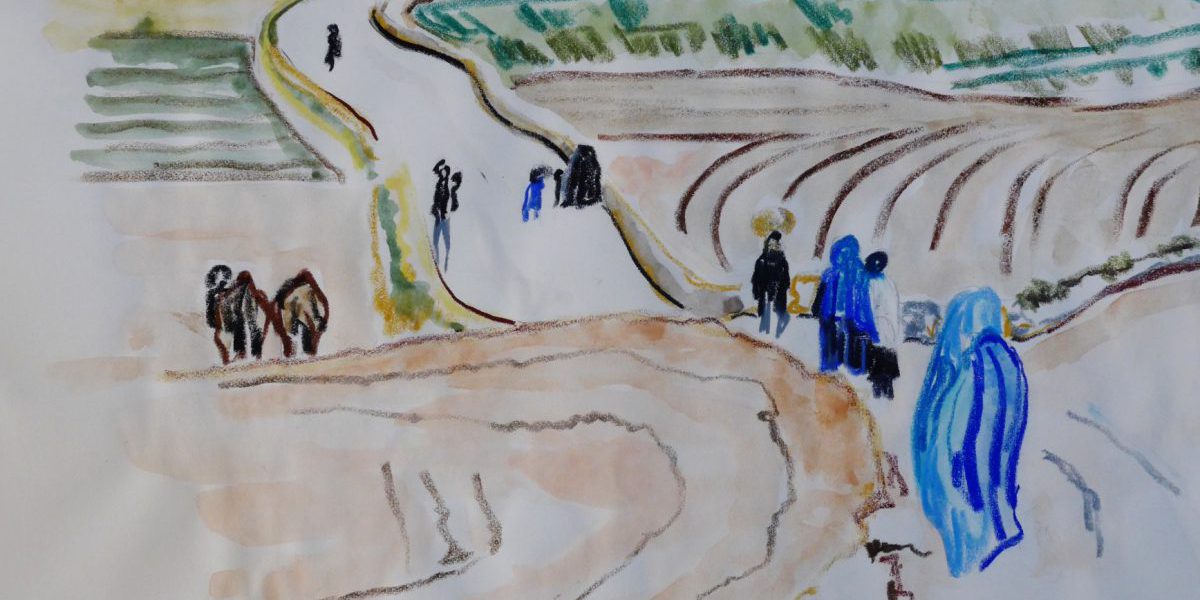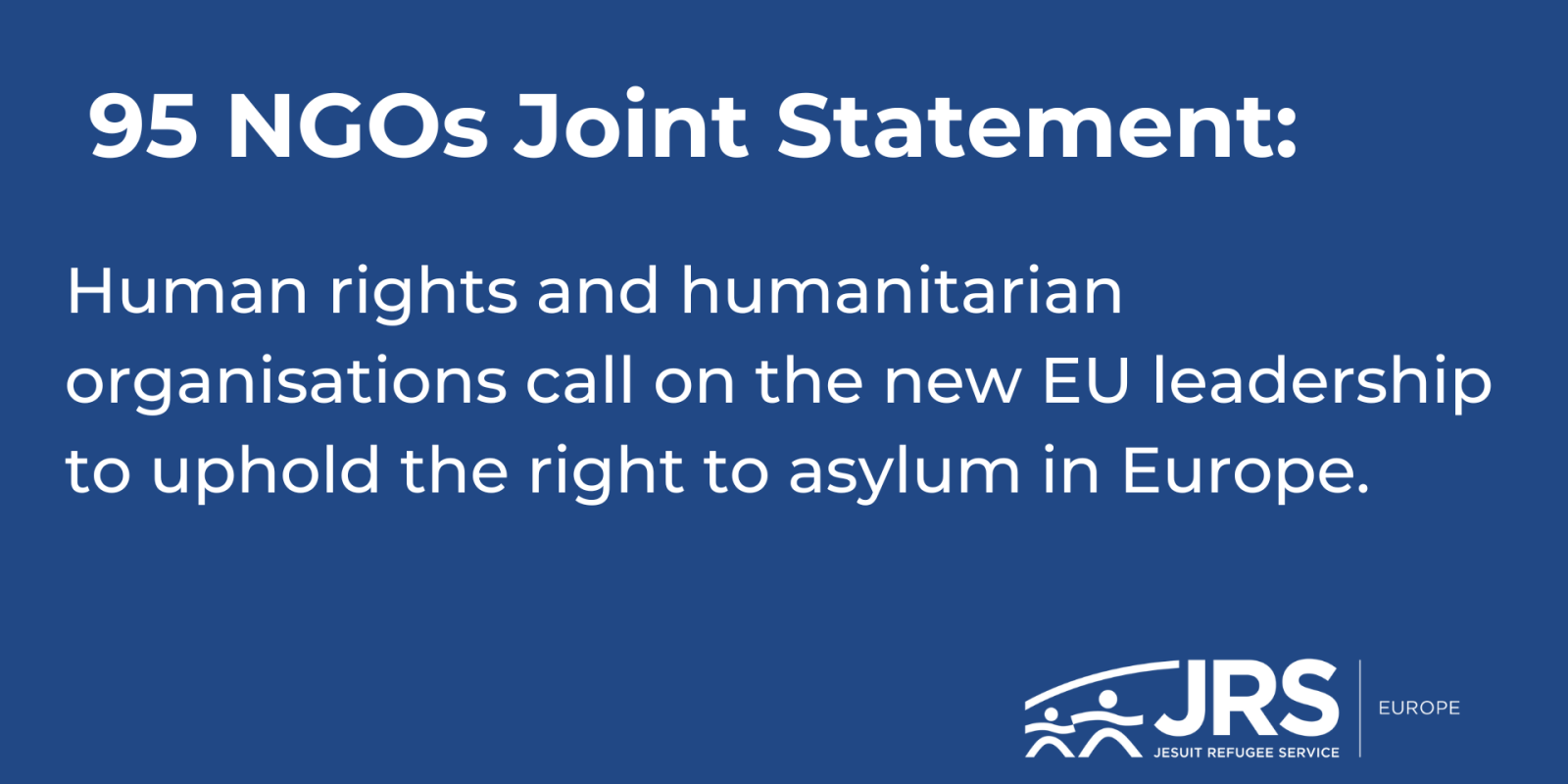New lives, uncertain futures: experiences of Afghans in displacement
16 August 2022|Jesuit Refugee Service International

One year after the Taliban takeover, the humanitarian situation in Afghanistan remains challenging. More than half of the population is currently dependent on humanitarian assistance, with many internally displaced people living in makeshift settlements.
Outside of Afghanistan, those who left are also facing the challenges of trying to rebuild their lives in a new place. Below, Afghan refugees share their experiences of displacement, their attempts at integration, and their dreams of returning home and reuniting with their families.
Download the booklet and read Afghan refugees’ experiences of displacement, attempts at integration, and dreams of returning home and reuniting with their families.
Let’s not forget them.
To return: an impossible dream
“If now someone asked me, if there is no Taliban, if your life is not in danger, will you go back? I will say yes, why not, because everyone I love is [there].”
Abdul* fled Afghanistan in the aftermath of the Taliban takeover. Like many others whose lives were put in grave danger by the change of regime, he had to make a difficult decision in very little time. “I was not able to think that I will not be back in Afghanistan.”
Ten months later, he has made a lot of progress integrating in Italy, where he currently lives with his wife and child. He is learning Italian and has gotten a job, but his thoughts are often of his home in Afghanistan, where his mother and siblings remain, and who need his support. With the limited? opportunities he has found in Italy, he still cannot help them as much as he would like.
Sometimes, Abdul feels like his life has not moved forward since he arrived in Italy: “We came here, and here we are nothing.” Then he brightens up and adds: “If I was in Afghanistan, the situation would have been worse. And that is what gives me a little energy.”
Abdul is not alone. Maryam, a young Afghan woman, is in a similar position. She fled Afghanistan last year with her husband and her siblings. After eight months in Italy, she is now pursuing a PhD in France. She is happy about this opportunity because returning to Afghanistan does not look like a possibility at the moment: “We hope and we pray that the situation gets better. There should be no refugees, but it seems that this is only a dream.”
To integrate: a multitude of challenges
Knowing that returning to Afghanistan is not possible, Afghan refugees are focusing their efforts on rebuilding their lives in new places. Integration, however, can be very challenging.
The first months are especially hard. The language barrier prevents refugees from interacting with the wider society, often worsening their sense of isolation. “It’s very difficult for you to sit and do nothing,” explains Maryam. She and her family were used to being active members of their communities back home and found it difficult to sit idly when they first arrived in Italy. Eventually, Maryam and her sister went on to their university studies, but her husband and brother are still waiting to re-enter the job market.
Maryam’s brother, a trained doctor, took on volunteering positions with the local Protezione Civile during the Covid emergency. In the meantime, her husband worked as a laborer for a company producing olive oil in the south of Italy. According to Maryam, these activities prevented them from feeling completely useless, but with their education titles unrecognized and few employment prospects, both men “are finding it difficult to cope.”
Not knowing what the future may hold, always depending on others, refugees’ mental health is constantly under threat. Sayed, too, struggled with his mental health. As a community leader back home, he found it hard to be inactive. All around him, his fellow countrymen were living in extremely difficult situations: “I do believe that every refugee will experience having depression,” he confided.
To help his fellow nationals, Sayed set up a language class to share what Italian vocabulary and expressions he was learning. He now supports over seventy families remotely. “My class, it has two objectives,” he explains. “One is to help those who need it: as they have no English background, the explanation is in Dari. The second objective is for myself, to come out of depression.” Feeling a sense of purpose gave Sayed joy and helped him cope with the uncertainties of displacement.
While both Maryam and Sayed’s families managed to make the most of their challenging circumstances, integration cannot be a one-way street. Refugees everywhere need opportunities to heal, live in dignity, and contribute to the growth of their new communities. We must strive for a culture of encounter where everyone, refugees and local communities, can learn and benefit from each other.
To resettle: an endless wait
Not all Afghans have been able to reach a safe place. Many refugees who left Afghanistan over the past decades have fled to, and remained in, the first country available. In some instances, they have faced insurmountable challenges in accessing employment, education, and healthcare.
Fatima, who fled Afghanistan five years ago and sought refuge in a neighbouring country, had hoped her life would get better. Instead, she recounts, “it has been like leaving one trauma behind in Afghanistan, come here – and get new ones.”
Fatima struggled with similar challenges as those encountered by Abdul, Maryam, and Sayed. However, more severe restrictions on refugee rights left her with little hope for her future. it’s really tough to get a good job. Not for everyone, for Afghan refugees, because you might not be aware of the documentation, [have] illegal status, and it’s really tough,” she explains. Higher education is also impossible to access.
After five years in a limbo, thanks to a resettlement programme for vulnerable refugees sponsored by a foreign government, Fatima and her family will soon have the chance to start over. “I have so many plans. I was not able to do all the things I wished to do.” Fatima confides excitedly: “The very first thing is, I will go there, I will start studying. I’m not giving up on that, it was my biggest wish and desire from the very beginning – going to school, being a professor.”
Fatima and her family’s struggles are not unique. Their happy ending, however, is still too uncommon. The number of refugees resettled to third countries – as well as the number of visas available for vulnerable Afghans to leave their country – are far less than the number of people in need of protection.
We must not forget the people of Afghanistan
One year after the Taliban takeover, Afghans are no longer making headlines, but they are still suffering. We must not forget them. Concrete, durable solutions are needed so that they may heal, learn, and determine their own future.
Let’s stand united in calling for full protection and refugee status, as well as peace and democracy in Afghanistan, so that all Afghans may live safely and with dignity – wherever they may be.
Download the booklet and read Afghan refugees’ experiences of displacement, attempts at integration, and dreams of returning home and reuniting with their families.
*All names have been changed.
Originally published in JRS International:

